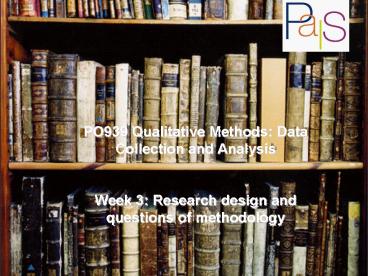PO939 Qualitative Methods: Data Collection and Analysis - PowerPoint PPT Presentation
1 / 7
Title:
PO939 Qualitative Methods: Data Collection and Analysis
Description:
Deviant cases, black swan' events. New methods and theories that beg application ... Mathieu L. L. Segers, and Johanna Maria van der Vleuten De Gaulle, Moravcsik, ... – PowerPoint PPT presentation
Number of Views:33
Avg rating:3.0/5.0
Title: PO939 Qualitative Methods: Data Collection and Analysis
1
PO939 Qualitative Methods Data Collection and
Analysis Week 3 Research design and questions
of methodology
2
- This weeks agenda
- Research design
- How we translate theoretical propositions into
concrete ways of doing research - How we might judge whether the sources for our
research are good sources
Follow up from last weeks introduction of
questions of reliability and validity in terms of
truth, the facts and the problem of silences
Reliability when results of research are
consistent and repeatable e.g. how we measure
happiness, poverty, intelligence, globalisation,
genocide, war
See Bryman on various types of validity (a)
Measurement validity (b) Internal validity (c)
External validity (d) Ecological validity
Validity when we can be sure that the measure we
chose measures what we think we are measuring
e.g. does IQ measure intelligence, does trade
volume measure the degree to which a country is
globalised?
3
Research design
- Linear models versus the the research
labyrinth (Burnham et al) - Feminist perspectives (Tickner)
Feminist knowledge-building is an ongoing
process, tentative and emergent feminists
frequently describe knowledge-building as
emerging through conversation with texts,
research subjects, or data (J. Ann Tickner
Feminism meets International Relations some
methodological issues, in Ackerly et al (eds)
Feminist Methodologies for International
Relations (CUP, 2006, p. 21)
Theory ? hypotheses
Data specification
Data collection
Data analysis
Publication
4
Individually Where (if applicable) do your
research questions come from? Groups Types of
research design Group 1 Is there any place for
experimental design in qualitative
research? Group 2 What issues come to light
when we consider longitudinal design in
political science/IR? Group 3 What are the
strengths and weakness of case study research
design in political science/IR
5
- Sources of research questions (adapted from
Bryman p. 70) - Intellectual puzzles/contradictions (deductive)
- Existing literature
- Replication
- Opposition to existing work
- A social/political problem in the real world
- Gaps between rhetoric and reality
- Counter-intuition (against conventional wisdom)
- Deviant cases, black swan events
- New methods and theories that beg application
- Personal experience
- Inspiration from teachers
6
Sources
Are there any basic rules of thumb that allow us
to differentiate between good and bad sources
for qualitative research?
- Andrew Moravcsiks rules (see The Choice for
Europe, Cornell UP, 1998) - the reliability of a source is a function of the
extent to which the activity it documents is one
in which it is costly to manipulate or misstate
the truth the greater the diffculty of
manipulating or concealing evidence of what
really occurred at the time, the more reliable
(the harder) the source in retrospect (p.82) - Hard primary (HP) direct evidence of
decision-making archives confidential minutes
of deliberations lengthy interviews with
participants - Soft primary (SP) contemporary news accounts
of an event, public statements, memoirs - Hard secondary (HS) use of sources that cite
HP, where you cant get hold of the primary
source - Soft Secondary (SS) scholarly publications
based only upon on SP and HS
7
Does this classification of source types make
sense? How might it be criticised? Is it likely
to work for your own research?
A cautionary tale!
Robert S. Lieshout, Mathieu L. L. Segers, and
Johanna Maria van der Vleuten De Gaulle,
Moravcsik, and The Choice for Europe Soft
Sources, Weak Evidence Journal of Cold War
Studies 6(4) (2004) pp.89-139































